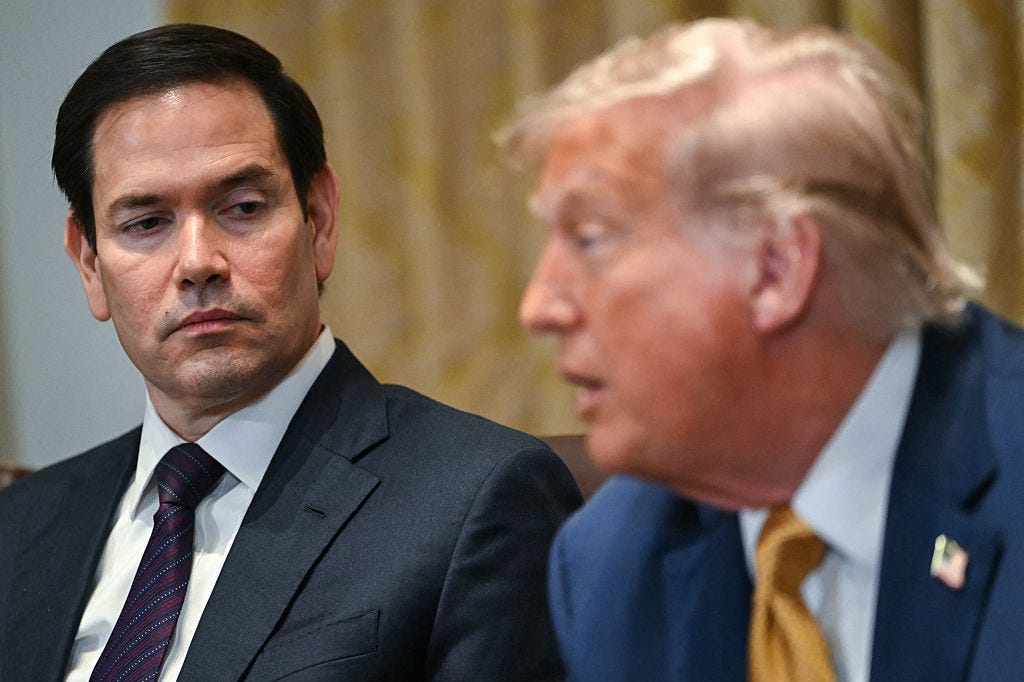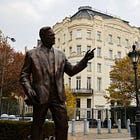An Open Letter to Secretary of State Marco Rubio
Please stop enabling this administration’s kamikaze foreign policy.

This article is brought to you by American Purpose, the magazine and community founded by Francis Fukuyama in 2020, which is proudly part of the Persuasion family.
Dear Secretary Rubio,
Last November, when your Senate colleagues unanimously confirmed you as the 72nd Secretary of State, I was hopeful that your strong record of fighting for human rights and speaking out against the inequality caused by “neoliberal” economic policies would shape your approach to U.S. foreign policy. However, after observing your first six months in office, including your decision in early July to fire over 1,300 State Department employees, I believe you have strayed from your principles.
The State Department firings are part of a larger pattern: The dismissals partially targeted the Department’s Bureau of Democracy, Human Rights, and Labor (DRL), and the Bureau of Population, Refugees, and Migration (PRM); they followed the Trump administration’s abrupt closure of the U.S. Agency for International Development (USAID) and the U.S. Institute of Peace (USIP); and they coincided with the administration’s rescission of $8 billion in U.S. foreign aid, including U.S. annual contributions to multilateral agencies such as UNICEF and the UN Development Program (UNDP).
I spent nearly my entire four-decade career working in those State Department bureaus, USAID, USIP, and UNDP. Since January, U.S. government and NGO sectors across the interconnected fields of human rights, democratic governance, conflict resolution, humanitarian aid, and economic development have been decimated; the global work of talented, dedicated, and experienced professionals has been reduced to unrecognizable caricatures; and my CV has been seemingly erased.
I am writing not out of pity for myself or my fired colleagues, but out of sorrow for our country: As Secretary of State, you are failing, despite the promise you made at your Senate confirmation hearing, to prudently balance America’s values with its material interests, a balance that has been for many decades enabled by these now weakened or abolished organizations.
I am especially disappointed in your leadership because I believe our family histories, professional commitments, and philosophies of international relations are all rooted in America’s defining story as a beacon of freedom.
Our families share a similar history.
They both arrived in the United States in 1956: yours in May from Cuba, escaping Fulgencio Batista’s dictatorship; and mine three months earlier from China, fleeing the dual dictatorships of Mao Zedong on the mainland and Chiang Kai-shek in Taiwan.
You were born 15 years later in Miami, after your parents decided they could not return to a Cuba suffering under the new dictatorship of Fidel Castro. Your parents built a solid foundation for your family through their hard work in the hotel industry. Others in your extended family—those who moved to the United States after Castro’s rise to power—benefited from the Cuban Adjustment Act of 1966. Sponsored by Senator Edward Kennedy and passed by huge bipartisan margins in the House and Senate, the Act granted Cuban exiles in the United States faster access to permanent residency.
I was born in Hong Kong in 1955, shortly before my parents were granted admission to the United States under the Refugee Relief Act of 1953. When President Eisenhower signed the landmark legislation supporting refugees fleeing communism, he said: “This action demonstrates again America’s traditional concern for the homeless, the persecuted, and the less fortunate of other lands.” I settled with my parents and my four older siblings in California’s Central Valley. My father worked long shifts at a grocery store, and my mother volunteered as a social worker for our local Catholic diocese.
Mr. Secretary, our similar family histories shaped our career interests.
During your time in the Senate, you championed U.S. support for human rights, democracy, and conflict resolution alongside like-minded leaders such as John McCain, Patrick Leahy, Tammy Baldwin, and Lindsey Graham. You demonstrated courage by sponsoring numerous important bills in these areas—including the Global Fragility Act (2019), the Hong Kong Human Rights and Democracy Act (2019), the Uyghur Human Rights Policy Act (2020), the Uyghur Forced Labor Prevention Act (2021), the Never Yielding Europe’s Territory Act (2022), the North Korean Human Rights Act (2023), the Mahsa Amini Human Rights and Security Accountability Act (2024), and the Support the Venezuelan Electorate’s Rejection of Dictatorship and Aspiration for Democracy Act (2024). Upon your nomination as Secretary of State, the International Republican Institute, where you served on the board from 2018 to 2024, praised you as “one of America’s foremost advocates for freedom and democracy.”
Eager to repay my family’s debt to the United States, I began my career in the State Department’s refugee bureau. During the Reagan administration in the 1980s, I tracked the tragic refugee flows in the Great Lakes region of Africa and developed educational materials for the large camps in Southeast Asia that sheltered the “boat people” fleeing communist repression in Vietnam, Laos, and Cambodia. In the 1990s, I worked on human rights and democratic governance programs at USAID and later at the State Department, supporting the democratic transitions that followed the collapse of the Soviet Union and the rise of people-power movements across Asia, Africa, and Latin America.
In the 2000s, I worked on similar initiatives at UNDP and promoted cooperation between the UN and the United States in assisting Iraq’s Coalition Provisional Authority. In the 2010s, I returned to USAID, supporting human rights, free and fair elections, independent civil society, good governance, and the rule of law in new democracies such as Ukraine, Myanmar, and the countries of the Arab Spring in the Middle East. In the 2020s, I worked at USIP, serving in the congressionally-mandated Gandhi-King Global Academy, which trained government and NGO officials worldwide in essential peacebuilding skills like negotiation, mediation, dialogue, and reconciliation.
And, Mr. Secretary, our similar experiences as refugees and immigrants have marked our international perspectives.
At your confirmation hearing on January 15, you stated that the United States must resist the triumphalism that has influenced much of U.S. foreign policy since the end of the Cold War. You warned that the pursuit of a liberal international order must not include a trading system that harms middle- and working-class Americans, weakens industrial capacity, and endangers supply chains; a concept of unlimited migration that destabilizes societies and governments; or a global community that allows autocratic powers like China, Russia, Iran, and North Korea to tap the liberal order’s benefits without fulfilling its obligations. Overall, you reminded us that America’s founding principle—that all people are created equal—can be upheld only if the United States pursues a foreign policy that balances our core interests with our fundamental values. “We will never be indifferent,” you said, “to the suffering of our fellow man.”
I also understand the tragic aspects of history and international affairs. In graduate school, I studied with the late Robert E. Osgood, whose book Ideals and Self-Interest in America’s Foreign Relations remains a key work on the need to balance idealism and realism in U.S. diplomacy. My doctoral thesis aimed to link the Lockean principles underlying Woodrow Wilson’s League of Nations initiative with the Hobbesian and Burkean ideas found in Hans Morgenthau’s version of ethical realism. Throughout my career, even as I proudly supported the post-Cold War international order, I shared your concerns about the danger of U.S. overreach and the economic inequalities caused by unregulated globalization.
It is because of our shared family histories, career commitments, and outlooks on international relations that I write, respectfully, to assert that the Trump administration’s foreign policy actions—including personnel cuts at the State Department, the elimination of USAID and USIP, and the reduction of U.S. contributions to UN agencies and programs—represent a dangerous departure from the balanced, bipartisan approach you maintained throughout your Senate tenure.
This departure is evident in the reasoning behind the State Department’s reorganization, as explained in your April 22 social media post. You write that reform is necessary because the State Department’s bureaucracy poorly supports U.S. foreign policy in a new era of great power competition. Specifically, you argue that the current State Department “stifles creativity, lacks accountability, and occasionally veers into outright hostility to American interests.” In your view, “the problem is not a lack of money, or even dedicated talent, but rather a system where everything takes too much time, costs too much money, involves too many individuals, and all too often ends up failing the American people.”
Very few people, especially experienced federal workers, would question the need to cut red tape and foster creativity in government. Yet you identify a surprising culprit: “radical ideologues and bureaucratic infighters have learned to play on this exhaustion to push through their own agendas that are often at odds with those of the President and undermine the interests of the United States.” Therefore, you propose to “drain the bloated, bureaucratic swamp” and root out special interests by reducing or eliminating the influence of “functional” bureaus, and correspondingly increasing the authority of “regional” bureaus.
You pay special attention to a specific set of functional bureaus: “the expansive domain of the former Under Secretary for Civilian Security, Human Rights, and Democracy (known internally as the ‘J Family’).” You describe the J Family as “a monstrosity of bureaus” that redefined “human rights” and “democracy” in ways contrary to U.S. interests. You accuse the human rights and democracy bureau of becoming “a platform for left-wing activists to wage vendettas against ‘anti-woke’ leaders in nations such as Poland, Hungary, and Brazil, and to transform hatred of Israel into concrete policies such as arms embargoes.” And you accuse the refugee bureau of having “funneled millions of taxpayer dollars to international organizations and NGOs that facilitated mass migration around the world, including the invasion on our southern border.”
Based on my four decades of hands-on experience within and alongside these State Department bureaus and related U.S. agencies, I see your description of the J Family—and, elsewhere, your portrayals of USAID and USIP—as representing the bluster of uninformed Department of Government Efficiency (DOGE) recruits rather than the nuanced perspective of a senior Senate Foreign Relations Committee member who closely oversaw these same entities for many years. Accordingly, I find both your diagnosis of and your prescription for the maladies of U.S. foreign policy to be tendentious and deeply flawed.
In diagnosing the State Department’s problem, you misrepresent the nature of the J Family bureaus and offices. The four J bureaus you inherited—the Bureau of Democracy, Human Rights, and Labor; the Bureau of Population, Refugees, and Migration; the Bureau of Conflict Stabilization Operations; and the Bureau of International Narcotics and Law Enforcement—were not utopian creations of recent Democratic presidents; they were established many decades ago through close executive-congressional consultation to address perceived gaps in U.S. diplomatic expertise. The five smaller J offices—focused on global criminal justice (war crimes and crimes against humanity), international religious freedom, anti-trafficking, antisemitism, and Tibet—share a similar history of bipartisanship.
The “J” in J Family stands for justice. Each day I felt as if I was working in the American tradition of Jefferson, Lincoln, and King. Collectively, the J bureaus and offices constitute the “values” component of the State Department and U.S. foreign policy more broadly. They provide the U.S. national security sphere with essential capacity in protecting human rights, preventing atrocities, building democracy, resolving conflict, and delivering humanitarian and economic aid. These bureaus and offices embody a broad consensus on the importance of American values and “soft power” in foreign policy. They have been repeatedly hailed by our generals and admirals as indispensable partners to the U.S. military in defending the nation’s security.
Furthermore, these bureaus and entities are institutional underdogs, chronically under-resourced and always overshadowed by regional bureaus that tend to focus on issues related to short-term economic or security relations. Presidents and congresses established the J entities to complement and balance the regional bureaus. However, this does not mean that these units operate as rebels. Like all bureaucracies, the State Department is highly hierarchical: the policies and programs of each administration are set and enforced by the Department’s senior leaders, ranging from the Secretary of State to under secretaries and assistant secretaries, all of whom are appointed by the White House and confirmed by the Senate. Additionally, congressional appropriations and foreign relations committees closely oversee the Department’s policies and programs. A single House or Senate member can place a “hold” on a program, effectively blocking its implementation.
In turn, your plan for a reformed Department is a simplistic solution that is likely to fail. Dismantling some J bureaus, significantly shrinking others, and consolidating “all non-security foreign assistance” in regional bureaus might speed up decision-making. But these actions will not effectively balance the full spectrum of U.S. interests. Instead, your “reforms” will silence the Department’s officers who are meant to represent the ideals that have made U.S. foreign policy uniquely effective. When executive and legislative leaders established the J bureaus and offices, they were not releasing a swarm of Lilliputians to tie down Gulliver; they recognized the need for institutional counterweights to a classic Realpolitik that would contradict the spirit of a New World diplomacy.
Overall, your belief that the J Family pursues an uncontrolled and un-American agenda is unfounded. Labeling the J entities “radical ideologues” is dogma unworthy of the bipartisan support you received in your confirmation and disconnected from your record of supporting these functional portfolios for many years.
Based on conflicting information on the State Department’s website, I assume that the Department’s reorganization is still in flux. For example, some elements of the original J Family are not listed on the July 1 organizational chart, but they appear on the homepage for the new Under Secretary for Foreign Assistance, Humanitarian Affairs, and Religious Freedom. I recommend that, as you finalize the reorganization, you maintain the J Family bureaus and offices as they are, assign them priorities based on the Trump administration’s policies, and cooperate with Congress to preserve the traditional balance between values and interests that has defined our diplomacy for over two centuries. I also recommend that once the hasty DOGE actions are fully evaluated, you rebuild USAID and USIP, and restore U.S. funding for UN agencies (lest domination by China in the UN becomes an unintended consequence of the administration’s approach).
Mr. Secretary, you and I are children of refugees: we understand firsthand the rise and fall of revolution and counter-revolution. No doubt, the America First movement is a response to the failures of globalization. Yet you describe the original U.S.-led post-World War II liberal order as having saved the free world from chaos. Like you, I see the successes and failures of globalization. I also see positives and negatives in the current retrenchment from the neoliberal order. Even amidst the turmoil in our domestic politics, I remain convinced that the effort to defend America’s founding values in our diplomacy has not been erased. Instead, the record of the fading order’s achievements, like the original texts overwritten in medieval palimpsests, will not only endure but also form an essential part of an emerging order.
At your confirmation hearing, you rightly said that 80 years after World War II, “we are called to create a free world out of chaos once again.” In my view, for America to do so, it must ultimately reconcile its revolutionary past with its counter-revolutionary present. Why? Because of the abiding duality of our ideals and self-interest: the United States was born from the revolutionary idea of natural, God-given rights; and our national security and prosperity are still today fortified not by repudiating our moral heritage but by leading a community of nations that respect human rights, practice democratic governance, and guide markets to produce wealth, social welfare, and equality of opportunity.
Mr. Secretary, as a long-time supporter of freedom and a practical exponent of American exceptionalism, you can lead the way.
Sincerely,
Dr. David W. Yang
Former Presidential Management Fellow, Bureau of Refugee Programs, State Department
Former Senior Coordinator for Democracy Promotion, Bureau of Democracy, Human Rights, and Labor, State Department
Former Senior Advisor, Washington Office, UNDP
Former Deputy Assistant Administrator, Bureau for Democracy, Conflict, and Humanitarian Assistance, USAID
Former Vice President, Gandhi-King Global Academy, USIP
David W. Yang worked for four decades with governmental, inter-governmental, and non-governmental organizations to advance human rights, democratic governance, and conflict resolution. He publishes The Falcon on Substack.
An earlier version of this piece was published on David Yang’s Substack.
Follow Persuasion on Twitter, LinkedIn, and YouTube to keep up with our latest articles, podcasts, and events, as well as updates from excellent writers across our network.
And, to receive pieces like this in your inbox and support our work, subscribe below:









A noble effort, Dr. Yang, but you are dealing with a man who has sold his soul to Donald Trump for a ‘seat in the room’, another shot at the Oval Office, and thirty pieces of silver, so do not expect a meaningful response.
David Yang provides a valuable insider's perspective on Trump/Rubio's utterly careless and reckless destruction of organizations which did enourmous good in the world, and at the same time served central U.S. interests. The Lancet recently estimated that the overnight elimination of USAID alone will kill 14M people (4.5M of them children) by 2030.